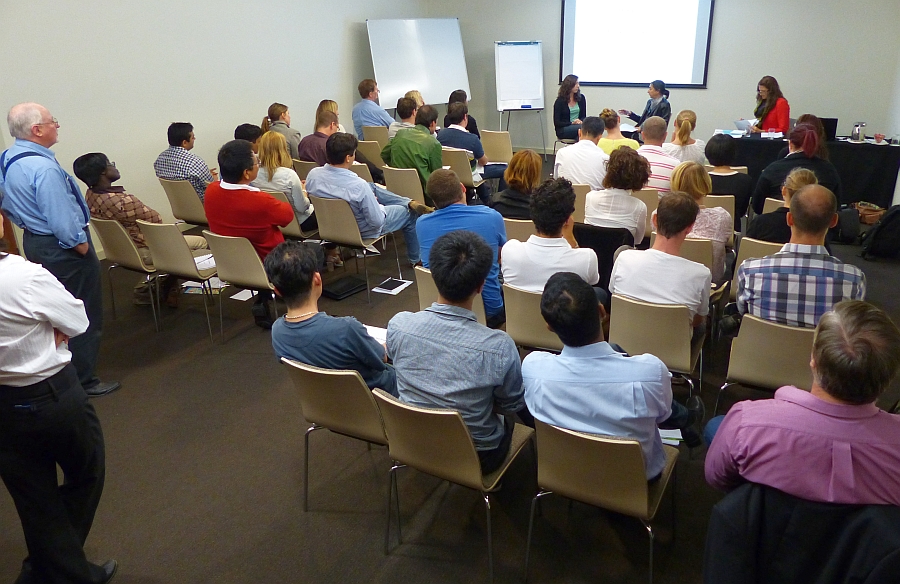Postgraduates, Post-doctorates and Interns from the Poultry CRC gathered recently in Melbourne for the CRC’s annual PoultryGrad workshop. Held over two and a half days, this year’s event featured classroom sessions from renowned Australian science communicator Julian Cribb and site visits to Ridley Agriproducts Feedmill and the Pfizer Animal Health (now Zoetis) manufacturing facility.
From the outset, students were keen to speak to one another, particularly those working in similar fields. The supremacy of face-to-face communication can be seen at events such as this where synergies are generated and deep connections made that would never arise via electronic channels. The event was also an excellent opportunity for Program Managers to catch up with postgraduate students working in their program areas.
Following a welcome dinner, the first full day commenced with Poultry CRC CEO Professor Mingan Choct speaking about leadership. He showed how a leader should work to achieve effective collaboration and innovation. Drawing from years of experience, he advised the audience that the best way forward in any given field is to seek out the ‘best people’ residing in that field, globally. He listed key points to remember when forming an effective team, and spoke of the importance of carefully managing multiple personalities. Professor Choct believes that “effective collaboration should lead to an enhancement of both parties’ capabilities and not an ‘averaging out’, which lowers the overall effectiveness and impact of the collaboration”.

Next, Julian Cribb presented on the art of science communication. Special emphasis was placed on communicating research to a broader, non-scientific audience. Julian bought with him two journalists from Coretext, a leading R&D custom publisher and communications agency in Australia, Dr Gio Braidotti (PhD in molecular genetics) and Ms Alexandra Roginski. These two reporters conducted mock interviews with selected students, ranging from professional through to tabloid-style interviews. Feedback received from this session showed that this was one of the highlights of the workshop.
Following this, Adam Naylor (General Manager, Alltech Australia) and Dr Tamsyn Crowley (Research Fellow in Bioinformatics, Deakin University), spoke about their experiences post-PhD in both the commercial and academic arenas. Adam encouraged the students to “question, question, question” those around them and to recognise opportunity, even in crisis. Tamsyn reflected on the contract-based nature of much research work, highlighting the need to apply for grants, network, collaborate and establish a good track record. Feedback from all sessions was extremely positive, with students commenting that they had gained a lot from the wealth of experience on offer.

The second day started with a field trip to the Ridley Agriproducts feed mill in Pakenham. Peter Cransberg, Greg Connors and staff gave a fascinating insight into the formulation and logistics of feed production, and students were taken a tour of the feed mill to see firsthand how feeds are produced and distributed. This was well received by all.
Following Ridley, attendees headed to Parkville to tour the Pfizer vaccine production plant. Here Dr John Power outlined the operations of the facility (both human and animal), and demonstrated the process involved in vaccine production from master seed to final market-ready product. A tour of both the production facility and R&D laboratories followed, where production processes could be observed first hand. This rare and fantastic opportunity was greatly appreciated by all who attended.
Overall, PoultryGrad 2013 was hugely successful. One can see in the attendees the future leaders of the Australian poultry industry. These young (some more than others), sharp and keen minds have been set to the task, and will no doubt have an impact on the industry not only in the domestic scene but also internationally.



